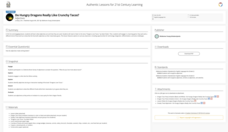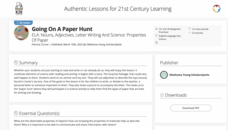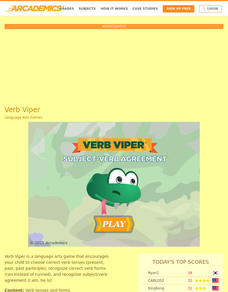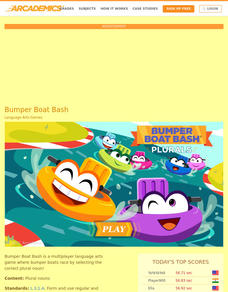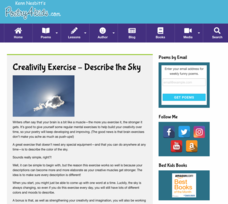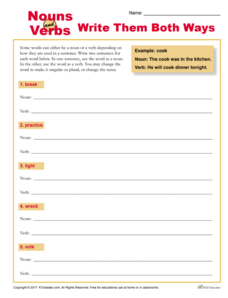Curated OER
What Is Poetry?
The first lesson of 12 in a poetry unit asks class members to develop their own definition of poetry. After crafting a response, they examine a variety of examples and decide if the resources are or are not poems.
K20 LEARN
Do Hungry Dragons Really Like Crunchy Tacos?: Adjectives
Tacos are the theme of a lesson all about adjectives. Scholars list as many adjectives as possible to describe tacos and play a game of Not Like the Others before reading Dragons Love Tacos by Adam Rubin. Peers guess their favorite foods...
K20 LEARN
Going on a Paper Hunt: Nouns, Adjectives, Letter Writing and Science - Properties of Paper
A lesson introduces scholars to nouns and adjectives. After listening to a short story and practicing creating adjectives with a card sort, pupils go on a paper hunt to locate different types of paper, complete a chart with adjectives,...
English Club
Verbs Associated with Housework
A two-page worksheet focuses on verbs associated with household chores. Intermediate language learners match phrasal verbs with their definitions and complete sentences and answer a series of "would you rather" questions. Learners...
English Club
Romance and Relationships
Romance and relationships are the subjects of an ESL activity designed for intermediate language learners. Class members match 10 sentences with the correct endings, match verbs with their correct definitions, and complete sentences...
English Club
Verbs Associated with Travel
An ESL vocabulary worksheet focuses on verbs associated with travel. Intermediate language learners complete 10 sentences using the correct verb, match five verbs with their definitions, and complete five sentences using the correct...
Roald Dahl
George's Marvelous Medicine
Six lessons comprise a unit about Roald Dahl's George's Marvelous Medicine. Over time, scholars explore themes such as the power of words, exciting writing, and mixed feelings. They examine the writing's literary devices, persuasive...
Arcademics
Verb Viper
Scholars show what they know about verbs with a quick snake-themed learning game. While verbs scroll across the screen, a viper snaps at correct combinations of subjects and verbs. Practice takes a look at to be and have verbs,...
Arcademics
Furious Frogs
A multiplayer learning game challenges scholars to match words making antonym pairs.
Arcademics
Octopus Feed
A fast-paced multiplayer game challenges scholars to identify homophones. Once the timer starts, a player's octopus grabs the focus word's homophone pair with its tentacle. The faster and more accurate a participant is, the more...
Arcademics
Word Frog
The Word Frog learning game challenges scholars to identify synonyms, antonyms, and homophones. Playing against themselves, participants turn a frog on a lilypad to snatch a sitting fly that holds a word.
Arcademics
Elephant Feed
Four elephants race to snatch up all the peanuts in a synonym learning game. Players turn into peanut hungry elephants in a synonym learning game. Opponents read a word and race to locate its synonym earning points till the time...
Arcademics
Bumper Boat Bash
Speed through a bumper boat course to practice making nouns plural. Scholars read 26 plural nouns and choose the correct form out of three to advance their boat closer to the finish line.
Curated OER
Vocabulary Instructional Routine: Synonyms
Young scholars work with word cards to define and identify synonyms, antonyms, and homophones. Participants listen to instruction, read word cards, discuss their new-found knowledge, and put it into action by creating sentences and...
University of Kansas
Feelings - Thematic Unit
Boost language skills with a unit all about feelings. Scholars from all grade levels take part in several lessons that incorporate specific vocabulary terms and adjectives while discussing their feelings with their peers. Reading...
Poetry4kids
Personification Poetry Lesson Plan
Scholars take part in two exercises to boost their knowledge of personification. After reading a detailed description and excerpts from famous poems, writers list action verbs and objects then combine words to create a humorous...
Poetry4kids
How to Write a Free Verse Poem
Budding poets compose an original free verse poem. Encouraged to use personification and alliteration, scholars read over three tips and examples then try their hand at drafting a poem of their own style.
Poetry4kids
Onomatopoeia Poetry Lesson Plan
Two exercises boost scholars' knowledge of a onomatopoeia with excerpts from famous poems. In exercise one, participants circle onomatopoeia words. Exercise two challenges writers to choose three words to use in an...
Poetry4kids
Creativity Exercise - Describe the Sky
Scholars stretch their writing muscles with an exercise that asks them to describe the sky using similes and metaphors.
Poetry4kids
Alliteration and Assonance Lesson Plan
Scholars analyze the poem My Puppy Punched Me in the Eye by Ken Nesbitt in order to locate examples of alliteration and assonance. After reading the poem, alliterative words are underlined and assonant words are circled.
Poetry4kids
How to Write an Alliteration Poem
Learners follow five steps to compose an alliteration poem. They choose one consonant and brainstorm as many nouns, verbs, and adjectives they can think of to create rhyming sentences that come together in a poetic fashion.
Read Write Think
Poetry Portfolios: Using Poetry to Teach Reading
Over the course of five periods, scholars create a poetry portfolio. They begin with a reading of the poem, Firefly. With a focus on vocabulary, learners reread the poem then look for sight words and other skills.
Poetry4kids
Simile and Metaphor Lesson Plan
Similes and metaphors are the focus of a poetry lesson complete with two exercises. Scholars read poetry excerpts, underline comparative phrases, then identify whether it contains a simile or metaphor. They then write five...
K12 Reader
Nouns Verbs: Write it Both Ways
A worksheet gives scholars the opportunity to take five words and use them as a noun and a verb. Changing the verb tenses and making nouns singular or plural work to compose a grammatically correct sentence.



